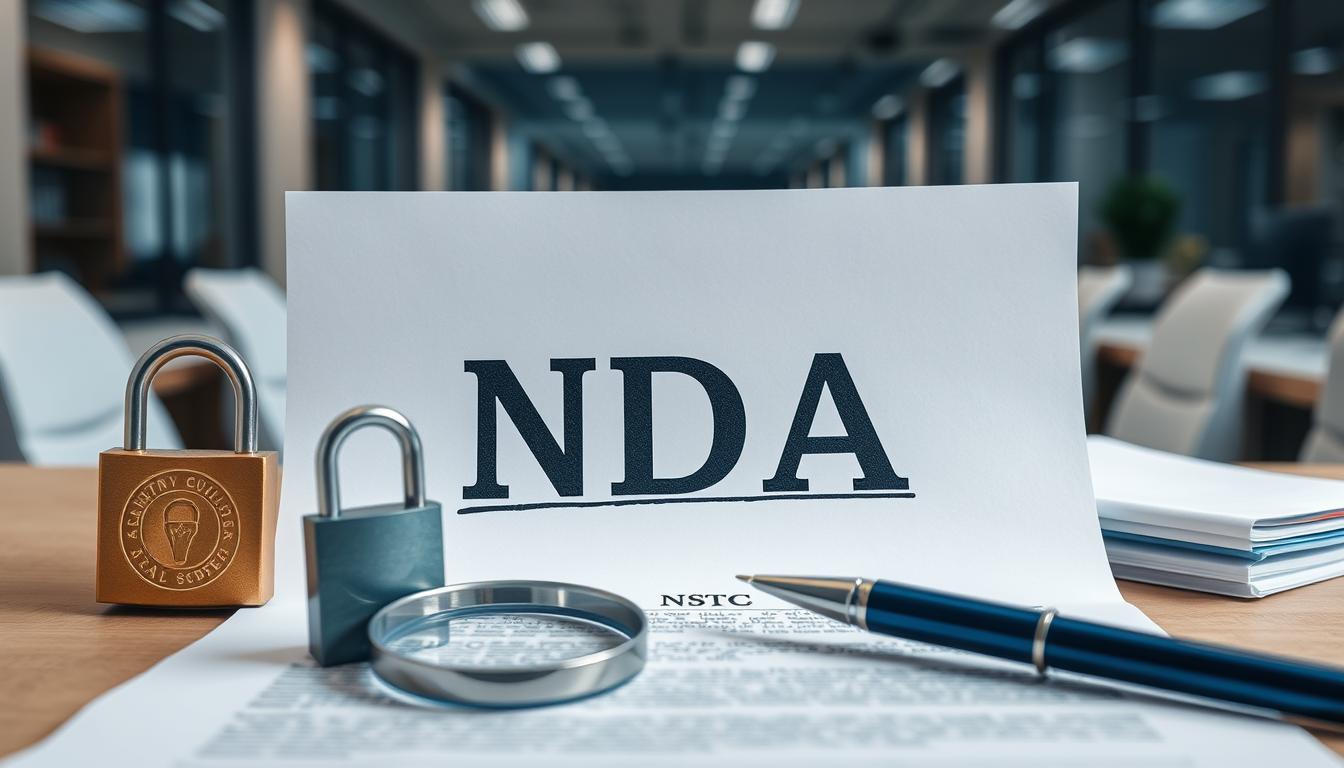Understanding Non-Disclosure Agreements (NDAs) and Confidentiality in Romania
Understanding Non-Disclosure Agreements (NDAs) and Confidentiality in Romania
Ever thought about how Romanian businesses keep their secrets safe?
Non-disclosure agreements (NDAs) are key in this.
They are contracts that keep sensitive info from getting out.
This helps keep important business details safe.
In Romania, NDAs help all kinds of businesses.
Small ones and startups use them to guard their secrets.
Keeping information private is very important in Romania.
It helps build trust between people working together.
NDAs in Romania follow the Romanian Civil Code and GDPR.

This makes sure these agreements work well and can be enforced.
Knowing about these legal rules is very important.
NDAs in Romania usually last about two years for business deals.
But, personal info is protected forever.
Some info might not be covered by NDAs, like things that become public or info found on your own.
Key Takeaways
- NDAs are essential for businesses of all sizes in Romania;
- They protect proprietary information, processes, and customer lists;
- Romanian NDAs must comply with the Civil Code and GDPR;
- The average confidentiality period is two years for commercial data;
- Personal information is typically protected indefinitely;
- Certain information categories may be excluded from NDA protection.
Introduction to NDAs in Romania
Non-disclosure agreements (NDAs) are key in Romania’s business world.
They keep sensitive info and trade secrets safe.
Knowing about NDA laws Romania is a must for businesses here.
Definition and Purpose of NDAs
NDAs are contracts that create a secret sharing relationship.
They stop the sharing of info without permission.
In Romania, they help protect trade secrets and proprietary knowledge.
There are three main types of NDAs:
- Unilateral: One party shares info with another
- Bilateral: Both parties share confidential info
- Multilateral: Many parties exchange sensitive data
Importance in Romanian Business Context
In Romania’s competitive market, NDAs are crucial.
They keep new ideas, strategies, and client info safe.
Confidentiality clauses Romania are key in talks, partnerships, and jobs.
They help build trust and encourage innovation by keeping info secure.
Legal Framework Governing NDAs in Romania
The Romanian Civil Code is the main law for NDAs.
These agreements must follow data privacy laws Romania, like GDPR.
Important parts of Romanian NDAs include:
- Clear definition of confidential info;
- Allowed use of shared data;
- How long the secrecy lasts;
- What happens if someone breaks the agreement.
By grasping these points, businesses can use NDAs well in Romania’s fast-paced market.
Key Components of Romanian NDAs
Romanian NDAs have important clauses to protect sensitive info.
These agreements set clear rules for keeping secrets.
When making an NDA in Romania, you must include key parts to make it work well.
- Identification of contracting parties;
- Definition of confidential information;
- Scope and duration of confidentiality;
- Intellectual property safeguards;
- Breach of confidentiality penalties;
- Jurisdiction and applicable law.
Your NDA should clearly list who is involved and what’s considered secret.
Say how long the secrecy lasts, from a few years to forever.
Also, add rules to protect your intellectual property.
Make sure to include penalties for breaking the secrecy rules.
These can be money fines or legal action.
Finally, say which laws apply if there’s a dispute.
This makes things clear if you go to court.
With these parts, you make a strong NDA to protect your business in Romania.
Always talk to a Romanian lawyer to make sure it fits your needs and follows Romanian laws.
Types of Non-Disclosure Agreements in Romania
In Romania, non-disclosure agreements (NDAs) are key in keeping secrets safe.
They come in different forms to meet various business needs.
Unilateral NDAs
A unilateral NDA Romania is for when one side shares secrets with another.
It’s common in jobs. For instance, a company might ask new employees to sign one to keep company secrets safe.
Bilateral (Mutual) NDAs
Bilateral NDA Romania is for when two sides share secrets with each other.
It’s used in partnerships or talks. Both sides promise to keep the shared info private, building trust and open talks.
Multilateral NDAs
Multilateral NDA Romania is for when many sides agree to keep secrets.
It’s good for big business deals or joint projects with many people involved.
| NDA Type | Description | Common Use |
|---|---|---|
| Unilateral | One-way information sharing | Employment contracts |
| Bilateral | Two-way information exchange | Business partnerships |
| Multilateral | Multiple parties involved | Joint ventures, complex deals |
Picking the right NDA is key to keeping secrets safe in Romanian business.
Each type has its own role and should match the situation and the people involved.
Legal Requirements for NDAs in Romania
In Romania, non-disclosure agreements (NDAs) are key to keeping secrets safe.
It’s important for businesses to know the NDA legal requirements Romania.
These agreements must follow the Romanian Civil Code and data privacy Romania rules.
NDAs in Romania cover many types of secrets, like technical data and customer lists.
They should clearly say what’s confidential and what can’t be shared.
Romanian intellectual property law is also important for NDAs, especially for tech companies.
These agreements help protect trade secrets and new ideas.
Keeping information secure is a big deal in Romania.
NDAs should talk about how to keep secrets safe and what to do with them when the deal ends.
| Key NDA Components | Legal Considerations |
|---|---|
| Purpose of Agreement | Must be clearly stated and lawful |
| Definition of Confidential Information | Specific and comprehensive |
| Duration of Obligations | Reasonable timeframe |
| Consequences of Breach | Enforceable penalties |
| Governing Law | Romanian law jurisdiction |
Employers in Romania need to make sure NDAs follow employment laws.
They can’t be used to stop people from speaking out.
Getting legal advice is a good idea to make sure NDAs work in Romania.
Non Disclosure Agreement and Confidentiality Romania: Best Practices
In Romania, keeping trade secrets and intellectual property safe is key for businesses.
To keep information confidential, understanding how to write and enforce non-disclosure agreements (NDAs) is vital.
Drafting Considerations
When making an NDA in Romania, use simple language.
Clearly state what information is confidential.
The agreement must follow the Civil Code, as published in Official Gazette no. 505 of 15 July 2011.
Include clauses for confidentiality, non-competition, and non-solicitation.
Also, outline when the agreement ends and how to handle confidential materials.
Enforcement Strategies
To make NDAs more effective in Romania, consider these steps:
- Include liquidated damage provisions;
- Outline injunctive relief options;
- Specify attorney fees as a remedy for breach;
- Define clear dispute resolution mechanisms.
Keep in mind, going to court can be expensive.
Regularly update and review NDAs to keep up with laws, like the Unfair Competition Law amended on 6 August 2014.
Common Pitfalls to Avoid
To effectively protect trade secrets in Romania, avoid these mistakes:
- Using overly broad definitions of confidential information;
- Neglecting digital data handling procedures;
- Failing to address cross-border confidentiality issues;
- Overlooking GDPR compliance in NDAs.
By following these guidelines, you can better protect your intellectual property in Romania.
This reduces the chance of confidentiality breaches.
Always talk to legal experts to make sure your NDAs meet Romanian laws and protect your business.
Confidentiality Clauses and Trade Secret Protection in Romanian NDAs
In Romania, confidentiality clauses are key to protecting trade secrets and proprietary data.
They are the core of Non-Disclosure Agreements (NDAs), offering strong Ip protection Romania.
A good NDA usually has three pages and details how Confidential Information is shared.
- Clear definition of confidential information;
- Transfer process documentation;
- Immediate notification requirements for unauthorized disclosures;
- Governing law (Romanian) and jurisdiction (Bucharest courts).
Data protection Romania is crucial in these agreements.
The NDA should say no warranties are given about the shared information’s accuracy or completeness.
This helps protect the party sharing the information from legal issues.
For strong proprietary data Romania protection, NDAs often have:
- Termination procedures (exclusive to the disclosing party);
- Injunctive relief in case of breaches;
- Written notice requirements with proof of delivery.
By adding these elements, Romanian businesses can make strong NDAs.
These agreements help protect valuable trade secrets and keep businesses competitive in the market.
GDPR Compliance and Data Privacy in Romanian NDAs
In Romania, data privacy rules are key in making Non-Disclosure Agreements (NDAs).
These agreements must follow the General Data Protection Regulation (GDPR). This ensures the security of business information and stops corporate espionage.
Intersection of NDAs and GDPR
Romanian NDAs now follow GDPR rules to protect sensitive data.
This change affects how companies deal with confidential and personal data.
For example, NDAs usually last 3 years, with confidentiality rules lasting 5 years after they end.
Data Protection Obligations in Confidentiality Agreements
Data protection laws in Romania make NDAs detail how to handle data.
They include:
- Limiting data access to those who really need it;
- Destroying confidential info within 30 days after the agreement ends;
- Keeping contractual data for 5 years after it’s over;
- Storing billing details for 10 years to meet legal needs.
Penalties for Non-Compliance
Not following data privacy rules in Romania can lead to big problems.
Companies must make sure their NDAs follow GDPR to avoid fines.
This means handling personal data right, especially for technical support and abuse prevention.
| Data Type | Retention Period | Purpose |
|---|---|---|
| Registration Data | Until account inactivity (30 days) | User management |
| Contractual Data | 5 years post-contract | Legal compliance |
| Billing Information | 10 years | Financial records |
| Technical Support Data | Duration of assistance | Customer support |
Enforcement of NDAs in Romanian Courts
Romanian courts are serious about keeping information confidential.
To prove a breach, you must show the violation and any damages.
They look at the agreement’s details and how well information was protected.
If someone steals a trade secret in Romania, they must provide solid evidence.
Keeping detailed records is key to winning a case.
This helps prove the breach and its impact.
Romanian courts can help in several ways:
- Injunctive relief to stop further breaches;
- Monetary damages to compensate for losses;
- Specific performance to enforce agreement terms.
The length of an NDA matters a lot.
NDAs usually last 24 months, but confidentiality can last up to five years after it ends.
Trade secrets are protected forever.
Romanian law oversees these agreements. Courts in Arad have the final say.
This ensures local enforcement while following global standards.
For agreements across borders, getting help from a legal expert is wise.
They can handle the complex legal issues.
International Aspects of NDAs in Romania
Romania’s business world is getting more global, making international NDAs key.
These agreements keep sensitive info safe across borders.
They need careful thought about legal details.
Cross-border Confidentiality Agreements
Cross-border NDAs in Romania need to follow international law.
They’re used before talks begin to protect competitive data.
These agreements outline who’s involved, what’s covered, how long it lasts, and what happens if there’s a breach.
Jurisdiction and Applicable Law Considerations
When making an international NDA in Romania, think about jurisdiction and law.
Romanian courts usually accept foreign NDAs that follow local laws.
They often include penalties to make enforcement easier without needing to prove harm.
Recognition of Foreign NDAs in Romania
For foreign NDAs to be recognized in Romania, they must meet local legal standards.
Info that’s public or needed by law is usually not protected.
It’s smart to share details with professionals who promise to keep it secret, like patent lawyers or legal advisors.
| Aspect | Consideration |
|---|---|
| Disclosure Risks | Unauthorized use of ideas, potential patent issues |
| Safe Disclosure | To professionals bound by confidentiality |
| Strategy | Avoid excessive secrecy, reveal broad concept |
| Caution | Be diplomatic yet firm, even with NDA protection |
Conclusion
Understanding the role of NDAs in Romania is key to protecting your business.
These agreements are essential for keeping trade secrets safe and maintaining confidentiality.
By using well-made NDAs, you can protect your company’s sensitive information and ideas.
NDAs do more than just protect legally.
They help build trust and professionalism in business dealings.
In Romania, where company info is limited, NDAs are crucial for keeping things private and safe.
Legal changes, like GDPR in Romania, have made confidentiality practices more complex.
You need to make sure your NDAs follow these rules to avoid fines and stay legal by getting advice from a experienced team of lawyers in Romania.
Keeping up with legal changes and adjusting your practices by accessing our team of Romanian Lawyers helps protect your business in Romania’s competitive market.
FAQ
What is the purpose of an NDA in Romania?
NDAs in Romania are contracts that keep sensitive info safe.
They protect business secrets in B2B deals and talks.
What are the key components of a Romanian NDA?
A Romanian NDA has key parts.
These include who’s involved, what’s confidential, how long it’s kept secret, and what happens if it’s not.
It also has rules for legal issues.
What types of NDAs are used in Romania?
Romania uses different NDAs. There are ones-way, two-way, and many-way NDAs.
Each type deals with sharing info differently.
What legal requirements must NDAs in Romania comply with?
NDAs in Romania must follow the Romanian Civil Code and GDPR.
They need to be fair and handle digital info well.
What are some best practices for NDAs in Romania?
Good NDAs are clear and specific.
They should be fair and reviewed often.
It’s important to avoid broad terms and handle digital data right.
How do confidentiality clauses in Romanian NDAs protect trade secrets?
Confidentiality clauses in NDAs define trade secrets and secrecy measures.
They also state what happens if secrets are shared without permission.
Romanian law sees trade secrets as intellectual property.
How do Romanian NDAs address GDPR compliance?
NDAs must follow GDPR.
They need to talk about data handling, how long data is kept, and data subject rights.
Not following GDPR can lead to fines.
How are NDAs enforced in Romanian courts?
Romanian courts look at the agreement’s fairness, how well info was protected, and evidence of a breach.
They can order actions to stop the breach and award money damages.
What considerations apply to cross-border NDAs involving Romanian parties?
Cross-border NDAs need to say who’s in charge of legal issues and where disputes are solved.
Romanian courts usually accept foreign NDAs if they meet Romanian laws.
What is a Non-Disclosure Agreement (NDA) and why is it important in Romania?
A Non-Disclosure Agreement (NDA), also known as a confidentiality agreement, is a legally binding contract between two or more parties that outlines confidential information that the parties wish to share with one another but restrict access to by third parties.
In Romania, NDAs are crucial for protecting business information, trade secrets, and intellectual property.
They establish a clear relationship between the parties and set expectations regarding the handling of sensitive information.
NDAs are particularly important in Romania due to the country’s growing business landscape and increasing international collaborations, which necessitate proper safeguards for valuable information.
What types of information can be covered by an NDA in Romania?
In Romania, an NDA can cover a wide range of confidential information, including:
– Trade secrets and proprietary processes
– Financial data and projections
– Customer and supplier lists
– Marketing strategies and plans
– Product designs and formulas
– Inventions and patent applications
– Research and development data
– Source code and software algorithms
– Personal data (subject to data protection laws)
– Negotiation strategies and terms.
It’s important to note that the agreement should clearly define what constitutes confidential information to avoid ambiguity and potential disputes.
How long does a Non-Disclosure Agreement typically last in Romania?
The duration of a Non-Disclosure Agreement in Romania can vary depending on the nature of the confidential information and the agreement between the parties.





